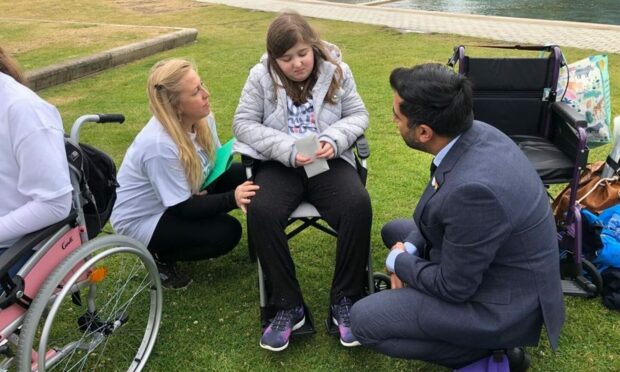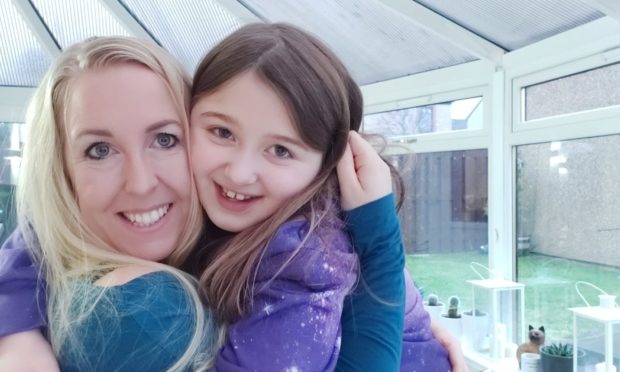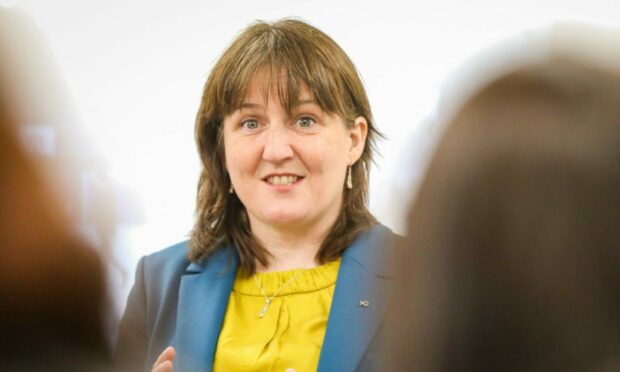A nine-year-old Aberdeenshire girl with long-term Covid problems has been forced to seek expensive online support and head to London for a private appointment.
Anna Hendy’s experience was raised at the Scottish Parliament among wider claims that patients across the north and north-east are struggling to find specialist neurological care.
Long Covid shares many of the same symptoms as ME, or chronic fatigue syndrome.
The nine-year-old, of Westhill, Aberdeenshire, has been battling health problems since her family fell ill with the virus in March 2020.
She has been forced to use a wheelchair and can only walk for around five minutes unaided.
Anna is unable to attend school due to the severity of her health problems, instead receiving 30 minutes a week from a tutor at home.
‘£5,000 treatment’
Helen Goss, Anna’s mum, says the family have spent around £5,000 in private treatment since her daughter contracted the virus.
They have so far been receiving virtual support from two specialists in London but will be travelling down south in March for a review.
Ms Goss said: “We had to go private to get treatment for Anna.
“This is what we see throughout Scotland. Families are seeking support and treatment from their NHS health boards and there’s nowhere for them to go.”
Her experience was highlighted at Holyrood by Aberdeenshire West MSP Alexander Burnett who said there are no specialist consultants in this field in Scotland, and only one specialist nurse.
Nursing role axed
Highlands and Islands MSP Rhoda Grant, who was also at the Holyrood debate on Tuesday evening, raised concerns about a decision by NHS Western Isles to cut their specialist MS nurse post, along with their specialist epilepsy nurse.
These roles have been replaced with an advanced general neurological nurse.
Ms Grant said the caseload for that one nurse has “increased profoundly”, with the individual estimated to support approximately 1,000 patients.
The Labour MSP said the recommended caseload for one nurse treating just MS patients is around 350 patients.
She added a proposal by the health board to have two full-time general neurological nurses will still leave the caseload “far too high”.
“I’m concerned this decision, made without consultation with patients, will be copied through Scotland, placing standards of care and accessibility to treatment at risk”, she told MSPs,” she added.
Funding still to be committed
The Scottish Government plans to allocate £4.5 million by 2025 to improving care for people with neurological conditions, including epilepsy, Parkinson’s and MS.
But half of this fund has yet to be spent with ministers urged to stump up the remaining £2.3m to support Scots with neurological conditions.
Public Health Minister Maree Todd confirmed the £2.3m is still available and said the money will be spent to have the “greatest impact”.
The SNP minister said she knows there are “human stories and individual experiences” behind the data.
She said: “We will continue the improvement work we’ve begun through the framework, collaborating with partners across statutory and third sector to achieve better outcomes and maximise the quality of life for people with neurological conditions.”
Alice Struthers, programme director for the Neurological Alliance of Scotland, welcomed the funding commitment from Ms Todd, describing it as a “big relief”.
She added: “However, currently Scotland does not have a neurological or mental health workforce available to meet the need of the one in six, let alone to provide person-centred care.”
An NHS Grampian spokeswoman said there are 15 full-time consultants working in neurology and “many nurse specialists”.
She added: “While we cannot comment on individual cases, health boards work together to meet the most complex and/or unique needs of patients.
“This is a key strength of continually improving treatments available across the country.”
NHS Western Isles was approached for comment.



Conversation